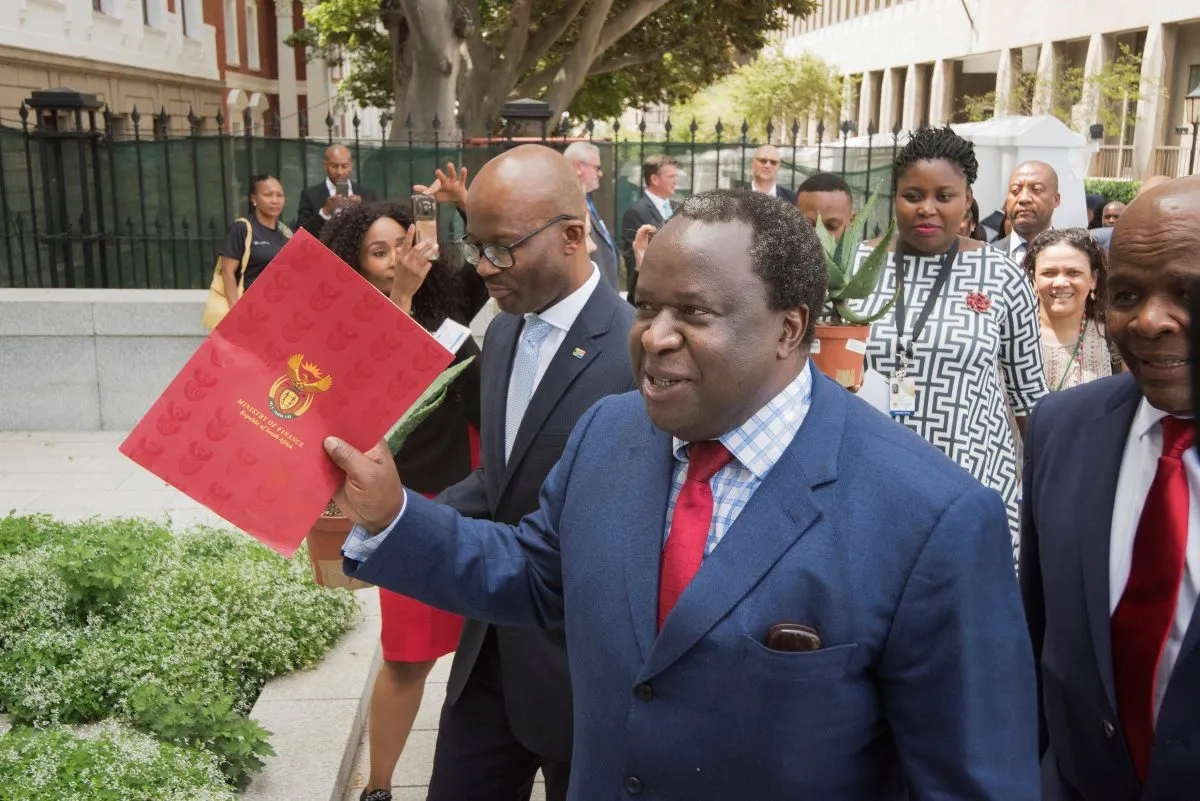Tito Mboweni, one of the last of the idealistic Young Turks recruited by Nelson Mandela to build a brighter future for post-apartheid South Africa and who rose to become the first black head of the Reserve Bank, has died after a short illness in Johannesburg. He was 65.
Mboweni grew up in poverty in rural South Africa, rose to be a firebrand of the anti-apartheid movement and ended up talking high finance with investors. He was a minister by the age of 35 and governor of the Reserve Bank at 40.
Mboweni was an influential and able governor and finance minister who used his larger-than-life personality and people skills to get things done.
“We have lost a leader and compatriot who has served our nation as an activist, economic policy innovator and champion of labour rights,” said South African President Cyril Ramaphosa in tribute.
A life in the struggle
Mboweni grew up an angry young man in the face of apartheid racial discrimination. In his home town of Tzaneen, Limpopo, black people weren’t allowed to enter most shops.
In 1980, Mboweni left for Lesotho where Chris Hani and his guerrillas were training fighters for uMkhonto we Sizwe, the military wing of the African National Congress.
Years later he told the Financial Times of his meeting with the battle-hardened guerrillas of Lesotho.
“You guys are so angry and militant, you’re going to cause havoc,” one of the guerrillas told them.
“You are not getting any arms. You are not ready to fight. You are raw… when all this fighting is over there will be a country to run.”
With this, the ANC despatched 21-year-old Mboweni, who already stood out for his fierce intelligence, to college. First to university in Lesotho, for a degree in economics and political science; then to England, where he studied economics at the University of East Anglia in Norwich.
In England, Mboweni was taken under the wing of future UK Labour minister David Blunkett, and always spoke fondly of his time there in the 1980s.
Yet, life in exile could be lean for members of the ANC. I was there on the night in Johannesburg when leading lights of the liberation movement bid farewell to his tenure as Reserve Bank governor.
Mboweni and his colleagues wistfully recalled attending an International Labour Organization conference in Switzerland.
“Remember, we didn’t have enough money for the tram, so we had to walk there sharing one cigarette,” said Mboweni with a laugh.
Return from exile
When Mboweni returned to South Africa, from exile, he was swept up in the optimism of the release of Nelson Mandela and the ushering in of democracy after the historic elections on April 27 1994.
Mandela named the sharp, young Mboweni as his first labour minister. Mboweni, despite having just turned 35, immediately began to reshape the country’s apartheid-era labour laws, which gave workers virtually no protection against the bosses of the white-owned firms that dominated the economy.
The new labour laws protected workers’ rights, establishing collective bargaining and labour courts. While some critics griped that they made it impossible to fire wayward workers, his idealism and sure grasp of his brief marked him out for promotion.
The call from the Reserve Bank came in 1999 and Mboweni, as the first black governor in the history of the institution, was quick to put down his marker.
I got a unique insight into the job on the night Mboweni arrived at my Johannesburg home for dinner.
Inside, over red wine, Mboweni told me of his first days at the Afrikaner-dominated Reserve Bank, where he was treated with suspicion by the majority white workforce. He said he was going to a conference on balance of payments and decided he needed to brush up on the subject.
He asked the librarian for books on the topic: soon there was a nasty rumour circulating around the Reserve Bank: “The country’s in trouble; the governor doesn’t know about balance of payments!”
Mboweni shook his head and looked at me with steel in his eyes: “I made sure that librarian was never in a position to make the same mistake again.”
Mboweni joked that it took the arrival of an English consultant for the Afrikaner-dominated workforce to direct their ire away from their first black boss.
“For months the Afrikaners at the bank were picking on me… Then they brought in this English consultant from the Bank of England and they all started picking on him and left me alone. So, I was alright!”
He ably stewarded the bank for a decade from 1999-2009, latterly helping the bank navigate the chaotic fallout of the US subprime mortgage crisis.
He told me that, baffled by the complexity of subprime instruments flooding the market, he had fortuitously managed to steer South Africa clear of entanglement in what turned out to be the inevitable collapse of what was effectively a Ponzi scheme.
“I am from Tzaneen. I didn’t understand it so I said: ‘no’ which probably saved the country billons!” he said with a chuckle.
Mboweni always had this disarming sense of humour.
A way with words
After leaving the Reserve Bank, Mboweni worked as an advisor for Goldman Sachs International and served as chairman at African bullion producer AngloGold Ashanti.
But he was recalled to public service in 2018 when President Cyril Ramaphosa called on his old colleague to serve as minister of finance after a decade of ”state capture” – essentially government-enabled corruption – under predecessor President Jacob Zuma.
Relishing his new role, Mboweni always had a way with words and was quick to turn a quote to his advantage.
He turned to Charles Dickens’s famous opening from A Tale of Two Cities when he opened his first address to Parliament.
“It was the best of times, it was the worst of times, it was the age of wisdom, it was the age of foolishness, it was the epoch of belief, it was the epoch of incredulity, it was the season of Light, it was the season of Darkness, it was the spring of hope, it was the winter of despair.”
At times, he blended his quotes with his trademark humour.
He once borrowed the words of UK Labour politician Denis Healey about Geoffrey Howe, Tory foreign minister under Margaret Thatcher, when responding to a political attack by hot-headed Floyd Shivambu, of the far-left Economic Freedom Fighters.
“Being savaged by Floyd Shivambu is like being savaged by a dead sheep,” Mboweni said in Parliament.
He reached back to ancient precedent to implore taxpayers to cough up for new taxes: and added his own mischievous twist.
“Render unto Caesar what belongs to Caesar, or else Caesar has a tendency to break your bones!”
As finance minister, Mboweni was unafraid to court controversy and make big calls, urging the government to close down the loss-making South African Airways as he looked to cut state spending amid a deteriorating economic situation.
He left government for the final time in a 2021 cabinet reshuffle shortly after a period of significant national unrest when Ramaphosa finally accepted his “longstanding request” to exit.
His service was complete.
Eminence worn lightly
Despite his garrulous reputation, Mboweni wasn’t always all quotes and laughs. He could be bombastic and withering towards young journalists who turned up at his press conference, especially if they knew nothing about economics.
“Why do you send these people?” he used to ask.
He also used to let fly at press photographers who snapped him unawares, especially when involved in one of his favourite hobbies – eating.
But overall, Mboweni wore his eminence lightly.
True, the “Duke of the Duchy of Makgobaskloof”, as he jokingly referred to himself, liked fine wine, expensive whisky and many of the trappings of a wealthy South African life. But he was just as at home eating pap with tomato gravy at a small town pub – and loved to share his own culinary creations with his 1.5m Twitter followers.
The outpouring of tributes from across the political spectrum is a tribute to the measure of a man who spent his life in the struggle and survived it without a whiff of scandal.
Sadly, such a record is a rarity in South African public life these days.
Want to continue reading? Subscribe today.
You've read all your free articles for this month! Subscribe now to enjoy full access to our content.
Digital Monthly
£8.00 / month
Receive full unlimited access to our articles, opinions, podcasts and more.
Digital Yearly
£70.00 / year
Our best value offer - save £26 and gain access to all of our digital content for an entire year!

 Sign in with Google
Sign in with Google 



